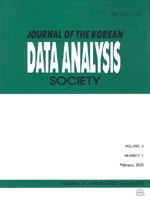기초생활보장 수급 노인의 성별 건강관련 삶의 질 영향요인
Factors Influencing Health-related Quality of Life by Gender among Elderly Beneficiaries of the National Basic Livelihood Security System: Using the Community Health Survey, 2010
- 한국자료분석학회
- Journal of The Korean Data Analysis Society (JKDAS)
- Vol.15 No.6
-
2013.123219 - 3233 (15 pages)
- 29

본 연구는 우리나라 기초생활보장 수급 노인의 성별에 따른 건강관련 삶의 질을 확인하고 이에 대한 영향요인을 규명하기 위한 것이다. 연구의 모집단은 전국 기초생활보장 수급노인으로, 질병관리본부의 2010년 지역사회건강조사 자료를 규정에 따른 연구계획서 제출, 심의 후 승인을 받아 SPSS 21.0 program을 이용하여 분석하였다. 연구결과 기초생활보장 수급 여성노인의 건강관련 삶의 질이 남성노인보다 유의하게 낮았다. 회귀분석결과 지각된 건강상태가 여성과 남성 노인 모두에서 건강관련 삶의 질에 가장 영향력이 큰 변수이었고, 만성질환 중 여성과 남성 모두에서 영향을 주는 변수는 관절염과 뇌졸중이었다. 아침식사는 남성 노인에서만, 아플 때 병원방문 포기한 경험, 우울증, 정기건강검진, 골다공증, 비만도는 여성 노인에서만 건강관련 삶의 질에 영향을 주었다. 이를 통해 경제적으로 취약한 계층의 성별 건강관련 삶의 질 향상을 위해서는 이들 영향 변수를 고려한 접근이 필요함을 알 수 있었다.
The purpose of this study was to explore predictors of health-related quality of life (HRQoL) by gender among elderly beneficiaries of the national basic livelihood security system. Data from the community health survey, 2010 conducted by the Korea Centers for Disease Control and Prevention were examined. The data were analyzed by SPSS 21.0 for descriptive statistics, t-test, ANOVA, Scheffé test and regression analysis. There were significant differences in HRQoL between genders. The most significant factor that affects HRQoL among elderly beneficiaries of the national basic livelihood security system was perceived health status. Two of chronic diseases affecting both aged women and men’s HRQoL were arthritis and stroke. The only variable affecting the aged men’s HRQoL was the breakfast. And the elderly women’s same variables were the experience of giving up hospital care, the depression, medical check up, osteoporosis, and body mass index. These results could be available for improving the destitute elderly’s HRQoL.
1. 서론
2. 연구방법
3. 연구결과
4. 논의
5. 결론 및 제언
References
(0)
(0)